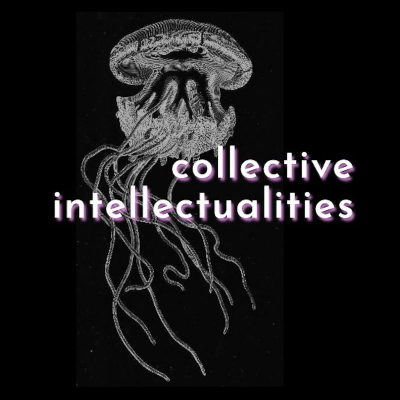
Collective Intellectualities
Podcast af Alex Means and Amy Sojot
Collective Intellectualities is a program that explores issues related to education within our world today. Convivial discussions with a diverse group of scholars, from different places in the world, engaging with different theoretical traditions, from multiple epistemological viewpoints on education, culture, politics, ecology, and related issues. Hosted by Amy Sojot and Alex Means. We are produced in conjunction with the Philosophy of Education Society of Australasia, their new digital venture PESA Agora, and the journal Educational Philosophy and Theory. || Philosophy of Education Society of Australasia - https://pesa.org.au/ || PESA Agora - https://pesaagora.com/ || Educational Philosophy and Theory - https://www.tandfonline.com/toc/rept20/current
Prøv gratis i 7 dage
99,00 kr. / måned efter prøveperiode.Ingen binding.
Alle episoder
19 episoderKenneth J. Saltman is Professor of Educational Policy Studies at the University of Illinois Chicago. Ken’s work covers neoliberal privatization, politics of education, culture, and subjectivity in education through critical theory and critical educational tradition. He joins us on this episode of Collective Intellectualities to chat about his new book, The Alienation of Fact: Digital Educational Privatization, AI, and the False Promise of Bodies and Numbers, out now on MIT Press. Links to selected works: The Alienation of Fact: Digital Educational Privatization, AI, and the False Promise of Bodies and Numbers (MIT Press, 2022) https://mitpress.mit.edu/9780262544368/the-alienation-of-fact/ [https://mitpress.mit.edu/9780262544368/the-alienation-of-fact/] The Disaster of Resilience: Education, Digital Privatization, and Profiteering (Bloomsbury, 2023) https://www.bloomsbury.com/us/disaster-of-resilience-9781350342439/ [https://www.bloomsbury.com/us/disaster-of-resilience-9781350342439/]
Andrew Gibbons, Professor at the School of Education at Auckland University of Technology, joins us on this episode to discuss his work in relation to philosophy, policy, science fiction, and care. His research creatively and distinctively focuses on philosophy of education and growing teacher education programs that engage academic and community relationships beyond disciplinary boundaries. Andrew is involved in several professional organizations, including Association of Visual Pedagogies and Philosophy of Education Society of Australasia (PESA), and was recently named a PESA Fellow. Links to recent works: Childhood, Science Fiction, and Pedagogy: Children Ex Machina (edited by David W. Kupferman and Andrew Gibbons, Springer Nature, 2019) https://doi.org/10.1007/978-981-13-6210-1 [https://doi.org/10.1007/978-981-13-6210-1] Love and Education Beyond the Event Horizon: An Apology to Christopher Nolan (2023) in Journal for the Philosophical Study of Education, vol. 4 https://research.library.fordham.edu/cgi/viewcontent.cgi?article=1058&context=phil_research [https://research.library.fordham.edu/cgi/viewcontent.cgi?article=1058&context=phil_research] Expressions of Wai in ECE: Te Wai Pounamu. National Report to International Pilot Project 2022: Wash from the Start—Local Conditions for Children’s Access to Water https://www.canterbury.ac.nz/media/documents/education-and-health/research/CWBI3455_ECE_Wai_Project_Report_WEB-(1).pdf [https://www.canterbury.ac.nz/media/documents/education-and-health/research/CWBI3455_ECE_Wai_Project_Report_WEB-(1).pdf] The Negation of Babysitting: Deconstruction and Care in Early Childhood (2020) in Global Studies of Childhood, vol. 10, issue 4, as part of the themed issue, “Philosophies, Politics, and Pedagogies of Care in the Early Years” https://journals.sagepub.com/toc/gsca/10/4 [https://journals.sagepub.com/toc/gsca/10/4]
For today’s episode, we’ll be chatting with Neil Selwyn, who is a Distinguished Professor in the Faculty of Education at Monash University. An internationally recognized scholar, Neil’s research focuses on digital education and technology. Neil’s recent projects explore data in schooling, digital labor, AI technologies, and sustainability in educational technology. Links to recent works: Digital degrowth: toward radically sustainable education technology (2023) in Learning, Media, and Technology https://doi.org/10.1080/17439884.2022.2159978 [https://doi.org/10.1080/17439884.2022.2159978] The future of AI and education: Some cautionary notes (2022) in European Journal of Education https://doi.org/10.1111/ejed.12532 [https://doi.org/10.1111/ejed.12532] Ed-Tech Within Limits: Anticipating educational technology in times of environmental crisis (2021) in E-Learning and Digital Media https://doi.org/10.1177/20427530211022951 [https://doi.org/10.1177/20427530211022951]
For this episode, we are sharing Keita Takayama’s talk originally given during the Department of Educational Foundations’ Fall 2022 Colloquium speaker series. Keita is Professor/Director for the Global Education Office in the Graduate School of Education, Kyoto University, Japan. His research examines the globalization of educational policy and knowledge from a decolonial/postcolonial perspective. In this talk, Keita provides a critical self-reflection of the work he does as a co-editor of two international journals in education and the tensions and contradictions that arise in relation to his own scholarship.
Mark Featherstone joins us for this episode of Collective Intellectualities. Mark is Professor of Social and Political Theory at Keele University, UK. He is author of Tocqueville’s Virus: Utopia and Dystopia in Western Social and Political Theory (Routledge, 2007), Planet Utopia: Utopia, Dystopia, and the Global Imaginary (Routledge, 2017), and editor of The Sociology of Debt (Policy, 2019), and Writing the Body Politic: A John O’Neill Reader (Routledge, 2019). He is also editor of Cultural Politics [https://www.dukeupress.edu/cultural-politics] (Duke University Press). We chat about the disenchanted university, themes of utopia and dystopia, and how growing up in Hull in the 1970s influenced the direction of his research. Links to select works: Tocqueville’s Virus: Utopia and Dystopia in Western Social and Political Theory (Routledge, 2007) https://www.routledge.com/Tocquevilles-Virus-Utopia-and-Dystopia-in-Western-Social-and-Political/Featherstone/p/book/9780415542470 [https://www.routledge.com/Tocquevilles-Virus-Utopia-and-Dystopia-in-Western-Social-and-Political/Featherstone/p/book/9780415542470] Planet Utopia: Utopia, Dystopia, and the Global Imaginary (Routledge, 2017) https://www.routledge.com/Planet-Utopia-Utopia-Dystopia-and-Globalisation/Featherstone/p/book/9780367864255 [https://www.routledge.com/Planet-Utopia-Utopia-Dystopia-and-Globalisation/Featherstone/p/book/9780367864255] The Sociology of Debt (editor, Policy, 2019) https://policy.bristoluniversitypress.co.uk/the-sociology-of-debt [https://policy.bristoluniversitypress.co.uk/the-sociology-of-debt] Writing the Body Politic: A John O’Neill Reader (editor, Routledge, 2019) https://www.routledge.com/Writing-the-Body-Politic-A-John-ONeill-Reader/Featherstone-Kemple/p/book/9780367726805 [https://www.routledge.com/Writing-the-Body-Politic-A-John-ONeill-Reader/Featherstone-Kemple/p/book/9780367726805]
Prøv gratis i 7 dage
99,00 kr. / måned efter prøveperiode.Ingen binding.
Eksklusive podcasts
Uden reklamer
Gratis podcasts
Lydbøger
20 timer / måned

































